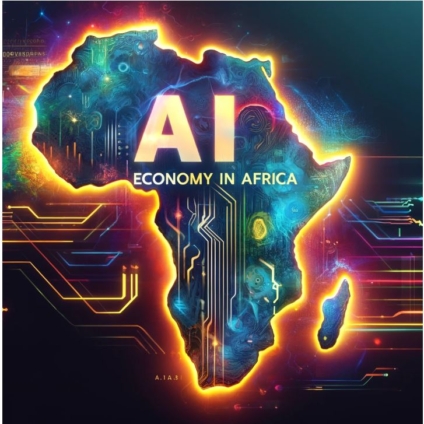- Introduction
Africa, a continent endowed with abundant natural resources and a youthful population, stands at a pivotal juncture. Its potential for rapid economic advancement is palpable, yet hamstrung by a plethora of structural challenges. Many of these nations boast some of the fastest economic growth rates globally, yet they continue to wrestle with persistent issues such as high unemployment, sluggish GDP growth, and over-reliance on conventional industries. Compounding these economic trials are infrastructural deficits, limited educational access, and underdeveloped technological sectors. This mix not only stifles economic mobility but also curtails the continent's overall progress and development.
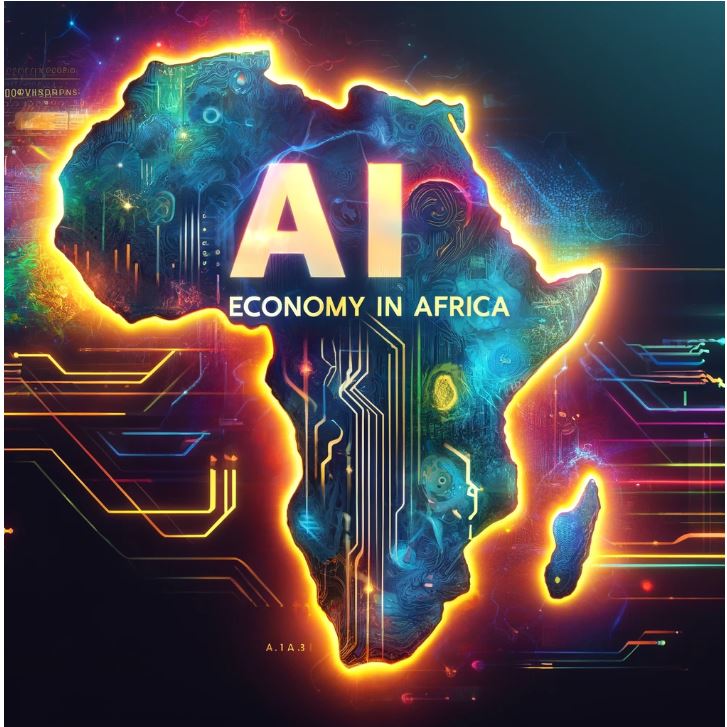
In this situation, Artificial Intelligence (AI) emerges as a potentially transformative force capable of reshaping Africa's economic landscape. The global AI market, projected to expand at an annual growth rate of 37% through 2030, positions AI as a significant contributor to Africa's economic development, potentially adding more than $15 trillion to the global economy by 2030 (African Development Bank Group) . However, transitioning to an AI-driven economy presents its own set of challenges. While AI promises new growth avenues and opportunities, it also brings the risk of job displacement in traditional sectors, necessitating proactive strategies to equip the workforce for future demands.
The embrace of AI in Africa requires substantial investments in technology and infrastructure, coupled with a significant emphasis on education and skills training. This will cultivate a digitally literate populace capable of leveraging AI for innovation and growth. The rapid adoption of AI could revolutionize key sectors like agriculture, healthcare, and education, enhancing efficiency and accessibility to meet the needs of Africa's growing population. However, transitioning to an AI-driven economy presents challenges, including the risk of job displacement. Embracing AI requires substantial investments in technology and infrastructure and a focus on education and training to equip the workforce for emerging jobs.
In 2023, Africa’s GDP was estimated at roughly $3.1 trillion, reflecting its economic magnitude and potential. Despite the significant economic challenges, the continent's GDP growth is expected to stabilize around 4% in 2023 and 2024, demonstrating resilience amid global economic fluctuations (World Bank Open Data).
Unemployment remains a critical issue, with rates varying significantly across the continent, necessitating focused interventions to harness AI's potential effectively . For African nations to fully harness the potential of AI, a careful and coordinated approach is essential. They must address the looming job displacement in traditional industries by fostering an environment conducive to innovation and the growth of new sectors. This includes investment in education, skill development, and the formulation of policies that promote the ethical use of AI, ensuring its benefits are widely distributed across society.
The AI economy presents an unprecedented opportunity for Africa to leapfrog into a future marked by enhanced productivity, innovation, and inclusive growth. By adopting AI, African nations can not only tackle their immediate economic challenges but also establish a robust foundation for a prosperous and sustainable future. The journey towards this promising future begins with recognizing AI's potential and taking concerted steps to harness it for the collective benefit of the continent and its people.
- What is AI Economy
The AI economy encompasses the economic activities generated by the widespread integration of Artificial Intelligence (AI) technologies across various industries. This economic paradigm is characterized by the utilization of AI to enhance productivity, innovation, and efficiency, fundamentally transforming traditional business operations and creating new market opportunities. At its core, the AI economy leverages intelligent systems capable of data-driven decision-making, automation, and learning from data without explicit programming. AI technologies are central to this economic shift, including machine learning, natural language processing, robotics, and computer vision. These technologies enable machines to perform complex tasks traditionally requiring human intelligence. For example, AI can analyze large datasets quickly and with high precision, predict outcomes based on historical data, automate routine tasks, and even make decisions in real-time environments.
The global AI market, valued at $62.35 billion in 2020, is expected to expand at a compound. annual growth rate (CAGR) of 40.2% from 2021 to 2028 (African Development Bank Group) In this burgeoning economy, AI's role is pivotal in enhancing productivity and facilitating the development of new markets. For instance, PricewaterhouseCoopers (PwC) forecasts that AI could contribute up to $15.7 trillion to the global economy by 2030, with $6.6 trillion stemming from increased productivity and $9.1 trillion from enhanced consumer and business effects. These contributions are significant, reflecting AI's capacity to not only streamline operations but also generate substantial economic output. However, the AI economy is not without its challenges. As it reshapes industries, it also prompts considerations about job displacement, privacy, data security, and ethical use of AI. These challenges require thoughtful approaches to integrate AI into societies, including robust regulatory frameworks, investment in AI education and training, and strategies to manage the transition for affected workers.
3. The Impact of the AI Economy Across Sectors
The AI economy is revolutionizing multiple sectors by enhancing efficiency, reducing costs, and driving innovation. Here, we explore the transformative impact of AI across several key industries.
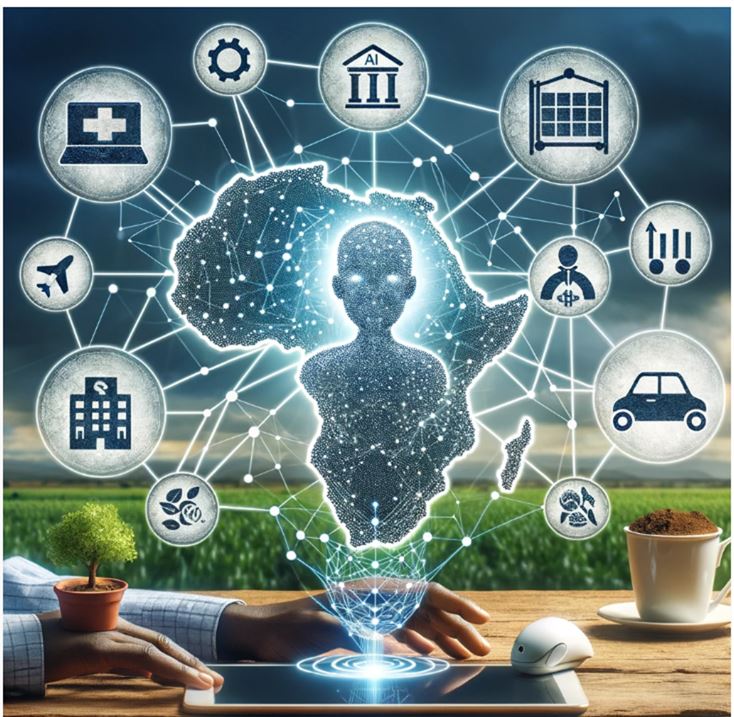
Healthcare
In healthcare, AI's potential to improve outcomes while reducing costs is significant. AI systems are increasingly used for diagnostic purposes, patient management, and personalized medicine. For instance, AI can analyze medical images with greater accuracy than some human counterparts. A study from Stanford University found that an AI model could identify pneumonia from chest X-rays with a higher level of accuracy than radiologists. Moreover, the global market for AI in healthcare is projected to reach $45.2 billion by 2026, up from $6.9 billion in 2021, reflecting a CAGR of 45.6% (Africa Development Bank).
Automotive
The automotive sector benefits extensively from AI, particularly through autonomous vehicles and advanced driver-assistance systems (ADAS). These technologies not only promise to improve safety but also redefine the driving experience. The adoption of AI in automotive manufacturing and logistics is expected to reduce production costs and enhance supply chain efficiency.
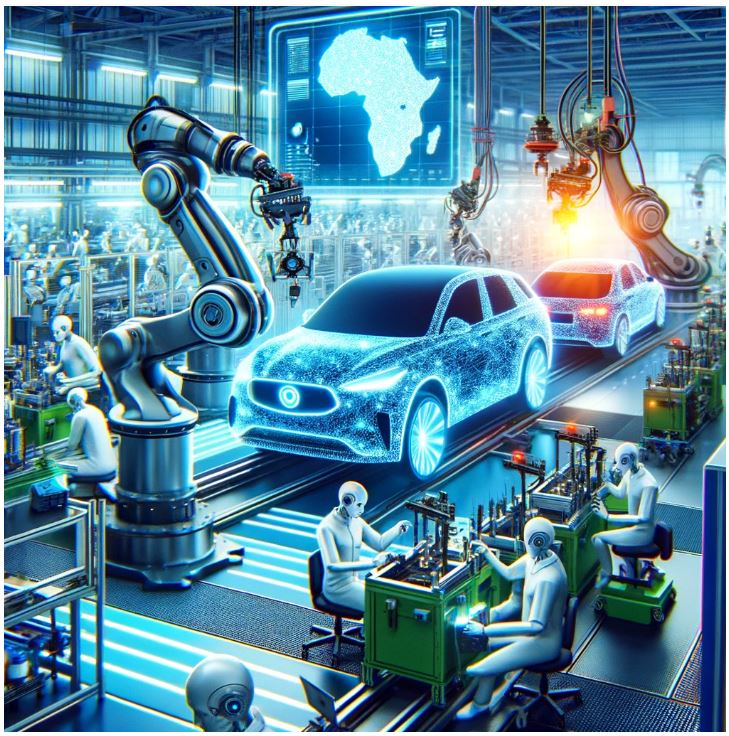
The market for AI in the automotive industry is anticipated to grow from $2 billion in 2020 to over $12 billion by 2026 (World Bank Open Data).
Finance
AI is transforming the finance sector by automating complex decision-making processes such as credit scoring and fraud detection. Banks and financial institutions use AI to personalize customer services and optimize operations. For example, JPMorgan Chase launched COIN, an AI program that interprets commercial loan agreements, saving approximately 360,000 hours of human lawyers' work annually (World Bank Open Data). The AI in fintech market size is expected to exceed $22 billion by 2025, demonstrating robust growth from approximately $6.67 billion in 2019 (African Development Bank Group).
Agriculture
AI applications in agriculture are set to revolutionize the industry by increasing crop yields and optimizing farming practices. AI-driven technologies such as precision farming, which uses AI to monitor and optimize the growth conditions of crops, are becoming increasingly prevalent.
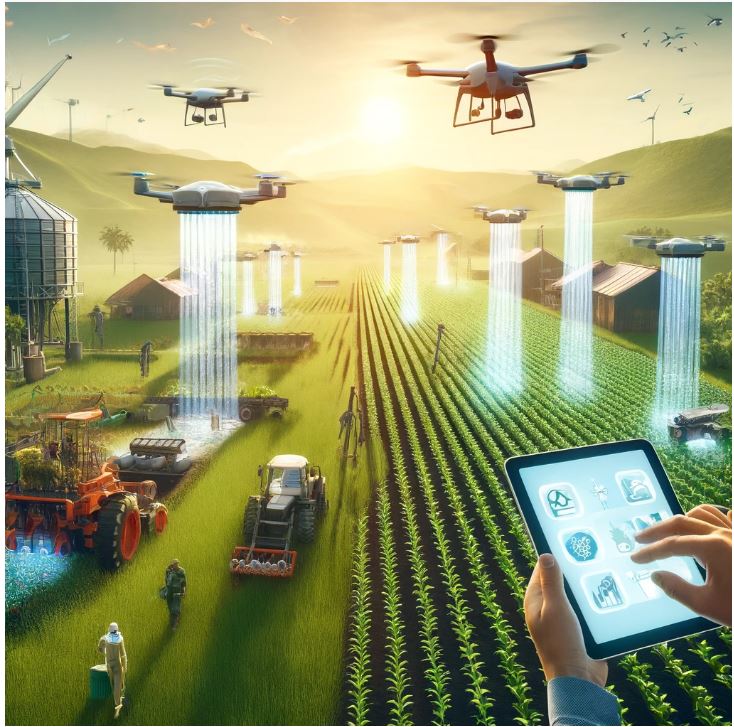
AI helps in predicting agricultural outputs, which enhances food security. According to the Africa Development Bank Group AI in agriculture market size is projected to grow to $4 billion by 2026, from $1 billion in 2020, indicating a CAGR of 25.5%.
Manufacturing
In manufacturing, AI is crucial for predictive maintenance, quality control, and supply chain management. AI systems analyze data from production lines to predict when machines will need maintenance before breaking down, thereby reducing downtime and maintenance costs. It is estimated that AI will increase the global GDP by $15.7 trillion by 2030, with a significant portion of this growth driven by enhanced productivity and consumer demand in manufacturing and other sectors (African Development Bank Group).
- The AI Economy's Impact on Africa's Economic Landscape
The AI economy offers transformative potential for Africa, providing both challenges and opportunities. By 2030, AI could contribute significantly to Africa’s GDP, with estimates suggesting that it could boost the continent's economic output by up to 26%, according to a report by PwC (PwC). This surge is expected as AI enhances productivity, automates processes, and opens up new business avenues.
While AI introduces efficiency and innovation, it also poses risks of job displacement. Traditional roles, particularly in manufacturing and administrative sectors, are susceptible to automation. The shift may lead to the displacement of jobs that rely heavily on repetitive tasks. However, this technological advancement is also predicted to create new job opportunities, especially in AI-driven sectors such as tech support, system maintenance, AI software development, and data management. The overall net effect could be positive if proactive measures are taken to reskill the workforce. For example, Microsoft’s initiative in South Africa aims to train 30 million people in AI skills by 2025, helping to mitigate unemployment risks and prepare the workforce for new technological roles (The Borgen Project).
AI technology is crucial for business innovation across Africa. In sectors such as agriculture, AI can optimize farming practices and enhance yield predictions, which is vital for food security and economic stability in rural areas. In the financial sector, AI improves service delivery and financial inclusion, allowing banks and fintech companies to offer tailored financial products to previously underserved populations (The Official Microsoft Blog) . With strategic implementation, AI has the potential to significantly raise Africa's GDP.
By enhancing industries' capabilities and creating new markets, AI can drive substantial economic growth. The African Development Bank highlights the resilience of African economies and the importance of leveraging technologies like AI to maintain and accelerate growth despite global economic uncertainties. To harness the full benefits of the AI economy, African countries need robust digital infrastructure, effective educational systems focusing on STEM and AI skills, and policies that encourage innovation while protecting the workforce from negative impacts. Moreover, fostering a startup ecosystem that can innovate with AI technologies tailored to African needs will be crucial.
- What the Countries and Industries in Africa Must Do
National Strategy for AI Technology
For Africa to fully leverage the potential of AI, each country must develop a comprehensive national AI strategy that aligns with its specific economic, social, and cultural contexts. This strategy should include substantial investment in digital infrastructure, such as high-speed internet and data centers, to support AI technologies and applications. Additionally, policies should be crafted to encourage local and foreign investments in AI-driven industries and to protect intellectual property rights within the AI sector.
AI Governance
Effective AI governance is crucial to ensure ethical standards and prevent misuse. Countries should establish regulatory frameworks that address data protection, privacy, and transparency.

These regulations must also include guidelines for ethical AI use, ensuring that AI systems are fair and do not perpetuate biases or discrimination. South Africa’s Protection of Personal Information Act (POPIA), which governs the processing of personal information, could serve as a model for other African nations (The Borgen Project).
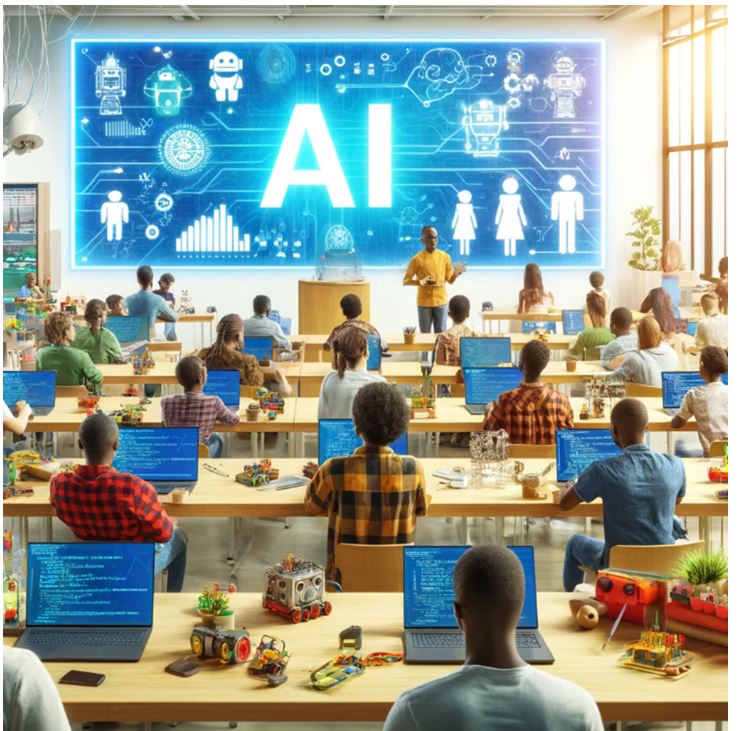
Training and Education
To foster a skilled workforce capable of propelling Africa into a leader in the global AI economy, it's crucial for African countries to prioritize education and training in advanced AI fields. This strategic focus should include the integration of AI, machine learning, deep learning, and advanced prompt engineering into the curricula of universities and vocational schools across the continent. Public-private partnerships are essential in scaling these educational initiatives. Prominent tech companies like Microsoft and Google are already playing a significant role by offering scholarships and specialized training programs in Africa. For example, Google's initiative aims to train 100,000 African developers in machine learning, equipping them with the skills necessary to innovate and drive technological advancement.
Adding to these efforts, significant initiatives like the one from the Africa Diaspora Central Bank, the Bank for Eco-6, and the Vanuatu Trade Commission aim to train 5 million youths in machine learning, deep learning, and advanced prompt engineering. This ambitious program represents a substantial investment in Africa's human capital, highlighting the potential of the African youth to drive economic growth and technological innovation on the continent.
Developing Local AI Expertise
To reduce dependence on foreign AI solutions, which may not always align with local needs, African countries should encourage the development of home-grown AI applications. This can be achieved by supporting startups and innovation hubs through subsidies, grants, and tax incentives. Local AI solutions can be particularly effective in addressing region-specific challenges such as local language processing, agricultural planning, and disease outbreak prediction.
Practical Steps and Projections
- Infrastructure Development: Countries should aim to increase their ICT infrastructure spending by at least 10% annually to create a robust foundation for AI technologies.
- Education and Training Expansion: At least 25% of tertiary institutions should offer AI-related programs by 2025, aiming to train over 500,000 AI professionals across the continent by 2030.
- Funding for AI Startups: Governments should aim to allocate a minimum of 5% of their annual budget to support technology startups, with special incentives for AI innovations.
- National AI Research Centers: Each country should establish at least one national AI research centre by 2025, focusing on developing AI applications tailored to local needs.
6.Conclusion
As we stand on the crossover of a technological revolution, the transformative power of AI in catalyzing Africa's journey towards industrialisation and economic prosperity cannot be overstated. With the AI market poised for exponential growth—expected to significantly impact global and African economies alike—the opportunities for Africa are both immense and transformative. The potential for AI to drive economic growth, enhance sectoral efficiencies, and address socio-economic challenges on the continent is clear.
However, realizing this potential requires concerted efforts and strategic foresight. African leaders and stakeholders across various sectors must prioritise investments in digital infrastructure, foster AI literacy and skills development, and cultivate an environment conducive to technological innovation and entrepreneurship. The initiatives from organizations like the Africa Diaspora Central Bank, the Bank for Eco-6, and the Vanuatu Trade Commission to train millions in AI technologies exemplify the kind of proactive measures that can catalyze growth and ensure that Africa does not just participate in, but actively shape the global AI landscape. By aligning AI strategies with broader economic and social goals, Africa can harness AI to not only boost productivity and competitiveness but also to create more inclusive economic growth that benefits all sectors of society.
The call to action for African leaders and the international community is clear: embrace the AI revolution with strategic intent and rigorous planning. This will ensure that the benefits of AI are not only realized but are also equitably distributed, driving sustainable development and a prosperous future for all of Africa. The journey ahead is challenging yet promising, and with the right mix of policies, investments, and collaborations, Africa can emerge as a beacon of innovation and progress in the AI-driven world.
-
About The Authors

Dr. David King Boison is the CEO of Knowledge Web Centre, a prominent research and consulting firm, Senior Research Fellow at CIMAG and Project Team Leader for the Vanuatu Trade Commission to Ghana on the AI Africa Project.

Albert Derrick Fiatui, is the Executive Director at the Centre for International Maritime Affairs, Ghana (CIMAG), an Advocacy, Research and Operational Policy Think-tank, with a focus on the Maritime Industry (Blue Economy) and general Ocean Governance. He is a Maritime Policy and Ocean Governance Expert.
Latest Stories
-
Egypt’s Al-Ahly part ways with coach Koller
2 hours -
Rafatu Inusah elected onto GOC Board
4 hours -
SAMSON’S TAKE: AG okays demo, how refreshing?
4 hours -
Trump questions Putin’s desire for peace after meeting Zelensky at the Vatican
5 hours -
Legend of The Week – George Darko
6 hours -
Kounde strike wins Copa del Rey final for Barcelona
11 hours -
Is NPP crying more than the bereaved in the Chief Justice saga?
12 hours -
“Elements within NPP worked against me for supporting ‘Ken must go'” – Cynthia Morrison
13 hours -
IMF Boss commends finance minister for strong commitment to economic reform
13 hours -
Cynthia Morrison advises Ghanaian women to diversify their skills to build wealth
13 hours -
UK deports 43 immigration offenders to Ghana and Nigeria
14 hours -
Piwak Natural Health urges Akosombo victims to rebuild with new donation
14 hours -
Ghana’s Para athlete Gilbert Ampiah wins bronze at Marrakech Grand Prix 2025
14 hours -
6 dead in Adansi Dompoase crash involving VIP bus and sprinter
15 hours -
Saturday’s heavy rainstorm caused outages within our network – ECG
15 hours

